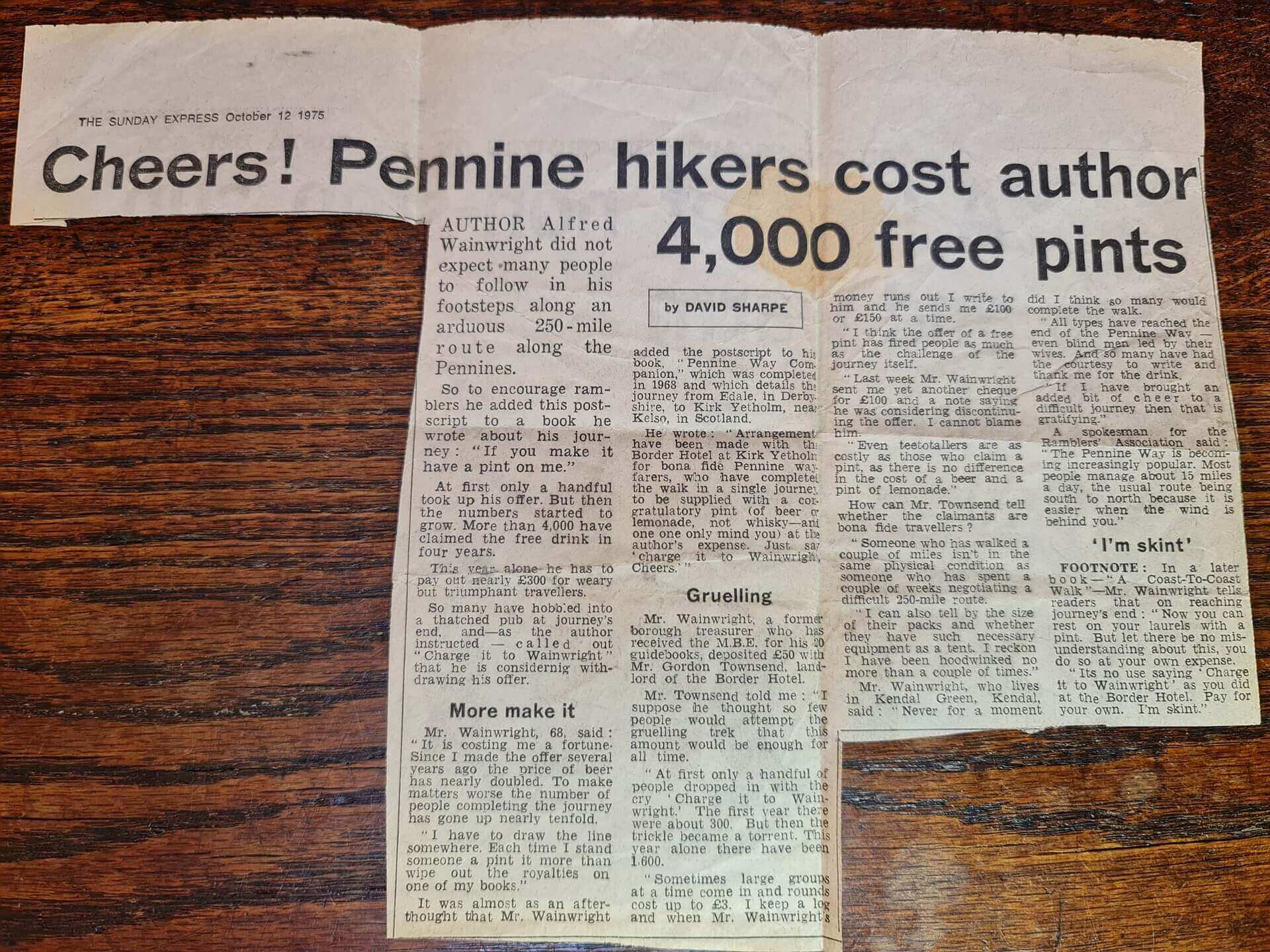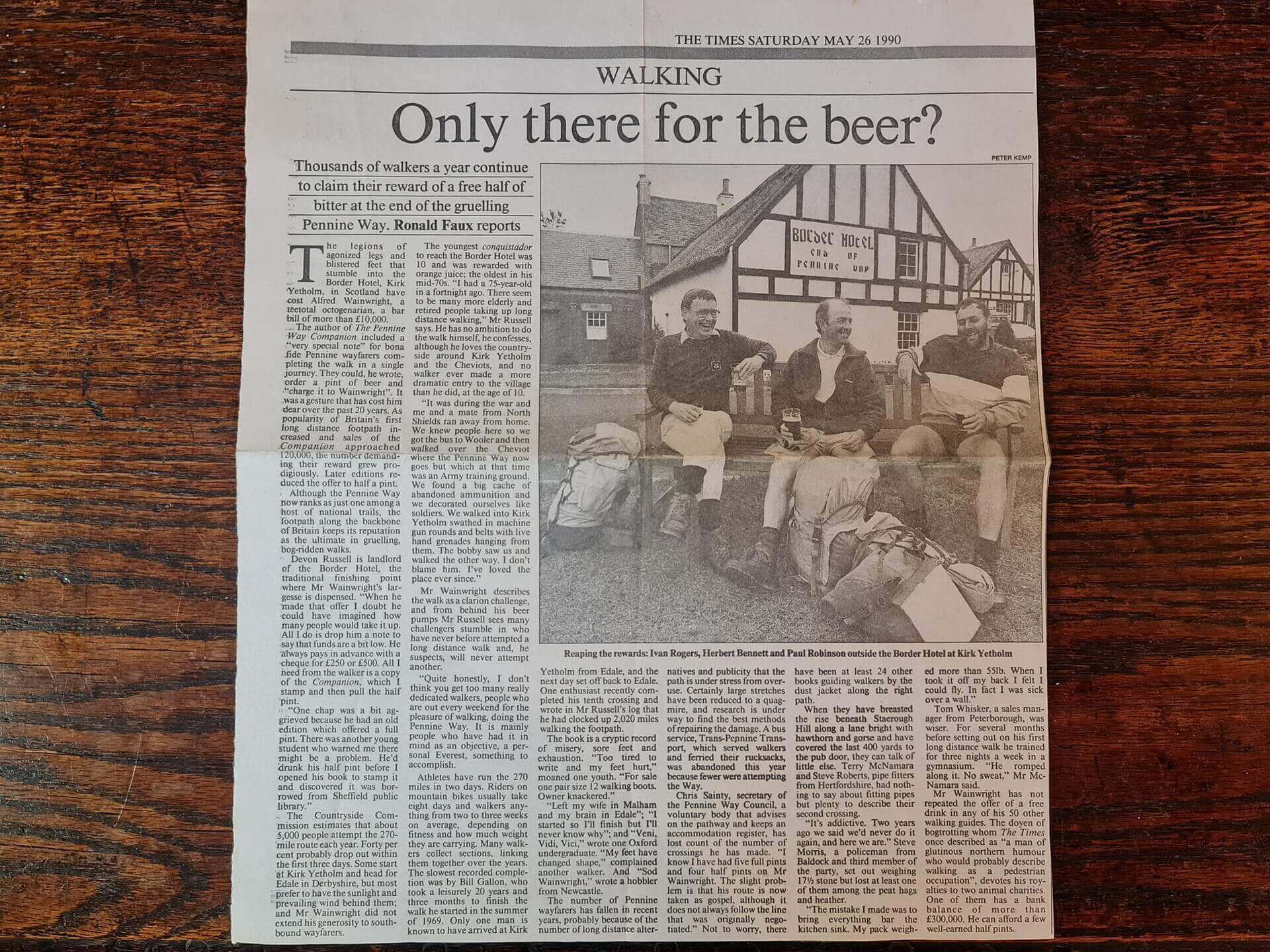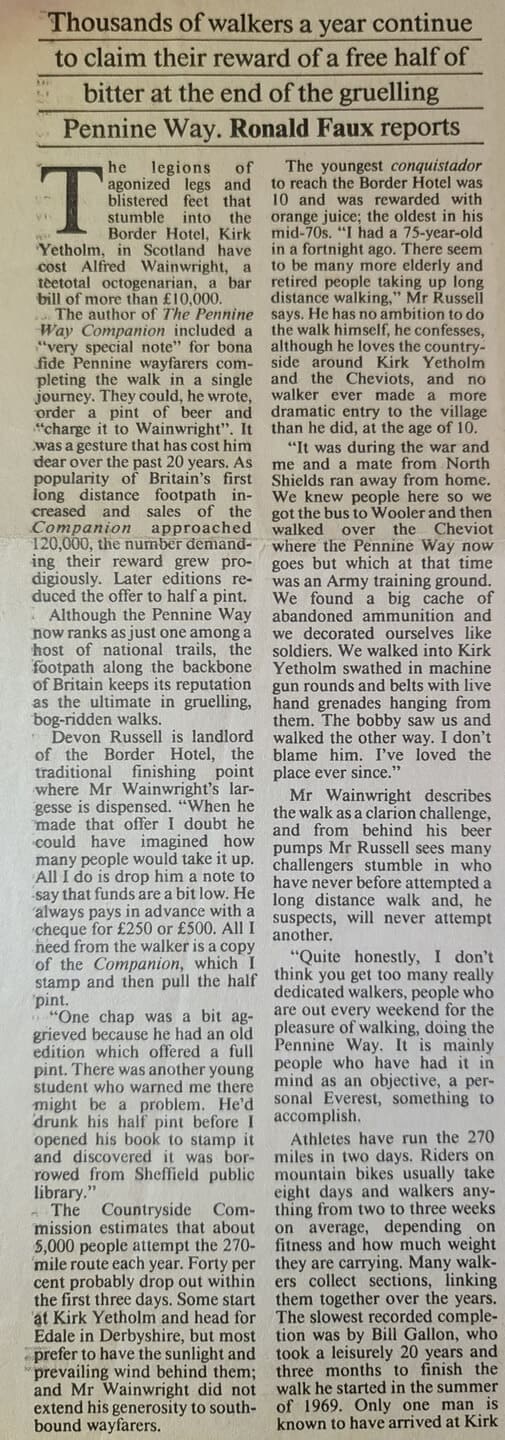The Pennine Way Pint
Article by Chris Butterfield
The Pennine Way, conceived by journalist Tom Stephenson in 1935 and officially opened on 24 April 1965, is Britain’s first long-distance footpath and has significantly influenced the British countryside. Inspired by the idea of a long walk from Scotland to Derbyshire, Tom Stephenson wrote the first official guidebook, which was published after the trail’s opening.
Alfred Wainwright, famous for his 1968 Pennine Way Companion, is often associated with the Pennine Way. Wainwright’s book, celebrated for its detail and personal reflections, is considered a seminal guide to the trail. His love-hate relationship with the Pennine Way, influenced by his personal life struggles during that period, adds a unique and sometimes poignant perspective to his writing.
The Pennine Way, along with the Coast to Coast walk, holds a special place in the hearts of many hikers, offering an experience of solitude and the beauty of the British countryside. Despite a decrease in popularity at one point, it has seen a resurgence, with many hikers completing the trail and celebrating their accomplishment with a traditional free half pint at The Border Hotel in Kirk Yetholm. This custom dates back to the trail’s heyday.
Below is a selection of older articles that focus on the Pennine Way during its most popular years, particularly highlighting the tradition of offering a free pint to those who complete the trail.

During the mid-1970s, the Pennine Way experienced a surge in popularity, drawing thousands of walkers eager to complete the trail and claim their reward, a tradition started by Alfred Wainwright. Initially, Wainwright promised a pint of beer to every walker who completed the trail, as mentioned in his Pennine Way Companion. This gesture was a significant part of the trail’s allure and became a celebrated aspect of the hiking experience.
However, the overwhelming popularity of the trail led to an unexpected financial burden for Wainwright. The cost of honouring his promise was substantial, as he personally financed the completers’ free pints. This financial strain led him to consider withdrawing his offer, but being a man of integrity, he decided to continue with the tradition, albeit with a modification.
By 1979, due to the financial implications and the impact of inflation, Wainwright was compelled to alter the offer. In the 65th impression of his guidebook, he made a minor edit, reducing the reward from a full pint to a half pint of beer. Though seemingly small, this change was significant for those who treasured the tradition and the symbolic reward for completing the arduous journey.

It seems that Alfred Wainwright may have underestimated the appeal and the challenge of the Pennine Way, particularly about his offer of a free pint for those who completed the 268-mile trek. Ronald Faux from The Times seemed to think so.



After Alfred Wainwright died in 1991, his generosity, estimated to have cost him around £15,000, was continued by others who recognised the value of this tradition to the hiking community. Notably, the publishing house Michael Joseph, which had been involved in publishing Wainwright’s works, stepped in to pick up the tab, ensuring that the tradition of rewarding Pennine Way completers continued.
In 2004, the tradition saw a new chapter when Philip and Margaret, the licensees of the Border Hotel at that time, struck a sponsorship deal with Carlsberg. This arrangement allowed the tradition of the free half-pint to continue, albeit with a different brewer. However, in a move to embrace local produce and quality, the sponsorship was later shifted to Broughton Brewery, a local microbrewery. This change supported local businesses and enhanced the experience for the walkers by offering them high-quality real ale. Additionally, Broughton Brewery contributed to the tradition by helping design certificates for each walker who completed the Pennine Way.
The Border Hotel, a key landmark for Pennine Way completers, underwent another change in ownership in 2013. It was bought by Michael McGuigan, with partners Douglas and Helen Scott-Watson, who were farmers from Kelso. Under their stewardship, the hotel continued to thrive and remained a pivotal point for the Pennine Way community.
As of the latest information, Hadrian Border Brewery is the current sponsor for the half-pint offered to Pennine Way completers. This continuation of the tradition, with different sponsors over the years, highlights the enduring significance of Wainwright’s original gesture and its place in the heart of the Pennine Way experience.


Heather Proctor, National Trails Officer, who works from the National Parks office at Grassington, has been commissioned to digitise the logs to view online. Ann Kilbey volunteers for Pennine Heritage at Hebden Bridge and is working on the project. Ann painstakingly scanned all the pages as jpegs and will create PDFs from the scans. It will be several months before the work is complete. Pennine Heritage have also scanned the newsletters for the Pennine Way Association to make them available online in the near future.
The initiative to digitise the logs of the Pennine Way is a significant step in preserving and making accessible the rich history of this famous trail. Heather Proctor, the National Trails Officer based at the National Parks office in Grassington, is overseeing this vital project. The digitisation of these logs will enable enthusiasts, historians, and the general public to view the detailed records of the trail online, thus broadening access to its historical data.
Ann Kilbey, a volunteer with Pennine Heritage in Hebden Bridge, is playing a crucial role in this project. Her work involves scanning all the pages of the logs as JPEG images, which are then converted into PDF format. This process is time-consuming and requires great attention to detail to ensure that the historical integrity of the logs is maintained in their digital form.
Given its extensive nature, the project is expected to take several months before completion. Once done, it will serve as a valuable digital archive, offering insights into the experiences of those who have traversed the Pennine Way over the years.
In addition to the logs, Pennine Heritage is also working on scanning the newsletters of the Pennine Way Association. This effort will further enrich the online resources available, providing a comprehensive view of the trail’s history with the broader goal of preserving and sharing the heritage of the Pennine Way with a wider audience.

Donating an original Pennine Way Companion dust jacket to James and Julie Borin, the current owners of the hotel associated with the Pennine Way, marks a significant gesture of continuity and respect for tradition. They kindly provided detailed information about the hotel’s history and photos of the Pennine Way registers.




